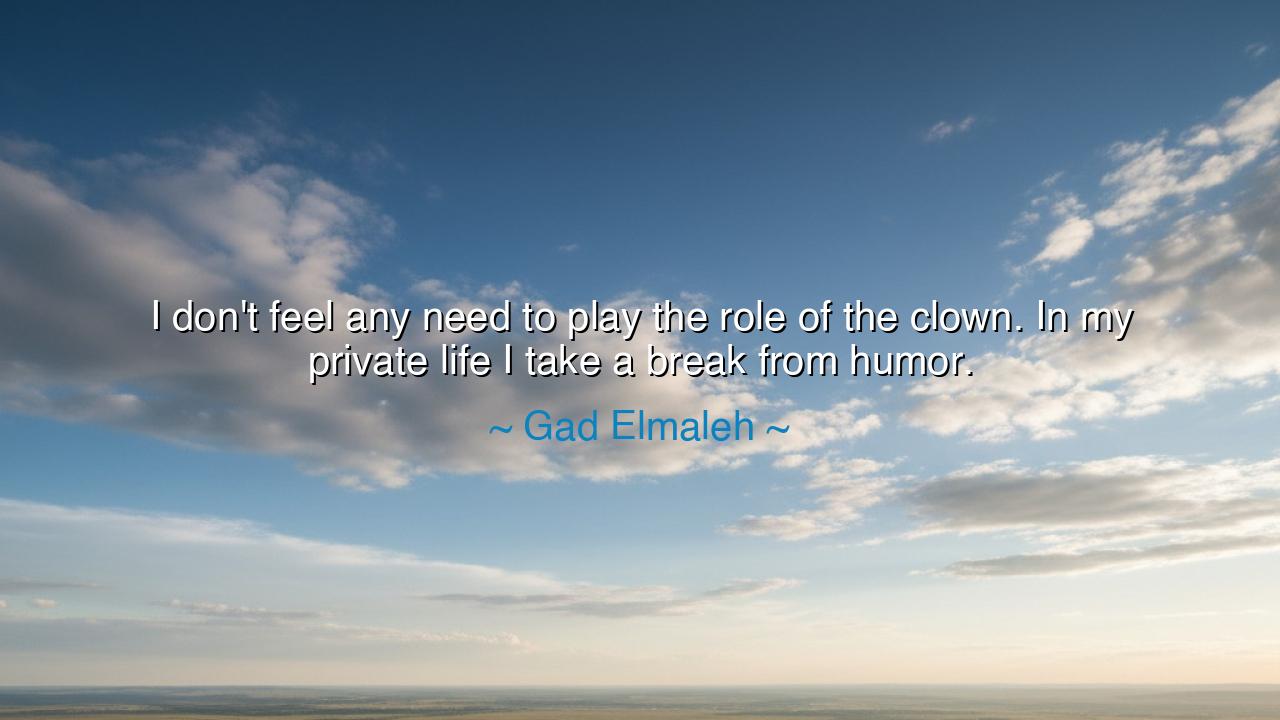
I don't feel any need to play the role of the clown. In my
I don't feel any need to play the role of the clown. In my private life I take a break from humor.






“I don't feel any need to play the role of the clown. In my private life I take a break from humor.”
Thus spoke Gad Elmaleh, the celebrated comedian whose laughter has echoed across nations, yet whose heart seeks silence beyond the stage. In these words lies a truth both ancient and profound: that even those who bring joy to others must rest in stillness, that behind the mask of laughter dwells a soul yearning for peace. The clown, symbol of mirth and chaos, bears the paradox of joy — for while his purpose is to make others smile, his own serenity often hides in quiet solitude. Elmaleh’s declaration, therefore, is not a denial of humor, but a reverence for balance — the wisdom of knowing when to speak light and when to breathe in silence.
To “take a break from humor” is to honor the rhythm of the spirit. For joy, like music, cannot be played without pause. Even the sun must yield to night so that dawn may be renewed. The great comedians, poets, and storytellers of the world have always known this secret: that laughter without rest becomes hollow, and performance without reflection becomes vanity. The ancient Greeks, who worshiped Dionysus, god of both theater and madness, understood that all mirth carries its shadow. The same divine force that inspires laughter can, when unbalanced, consume the heart. Elmaleh, in his wisdom, chooses rest over exhaustion, authenticity over illusion. He reminds us that the giver of joy must first be whole within himself before he can give joy again.
The role of the clown has been with humanity since time immemorial. In every culture, from the jesters of medieval courts to the sacred fools of tribes, the clown has carried truth disguised as laughter. Yet even these figures — adored by kings, loved by crowds — carried within them a quiet sorrow. The story of the Italian actor Enrico Caruso, who once wept after making an entire opera house laugh, speaks of this same duality. He, too, longed for silence after the applause, for the chance to exist not as a performer, but as a man. Gad Elmaleh’s words breathe that same ancient longing — the yearning to shed the painted smile and dwell, if only for a while, in the stillness of self.
To refuse the “need to play the clown” is an act of courage in a world that demands constant performance. The wise know that identity must not be chained to expectation. Elmaleh teaches us that one’s public gift need not consume one’s private truth. In this, he echoes the spirit of Charlie Chaplin, who once said, “I always like walking in the rain, so no one can see me crying.” Chaplin, like Elmaleh, lived between two worlds — the laughter of the crowd and the solitude of the soul. Both men understood that to sustain humor, one must preserve the silence from which it springs. Without inner stillness, laughter becomes noise; without solitude, art loses its soul.
This wisdom touches not only artists, but all who labor under the weight of roles. Each person wears many masks — of duty, kindness, and strength — yet beneath them all lies the yearning for authenticity. Elmaleh’s statement invites us to rest from the performance of life, to remember that we are more than what others expect us to be. Just as the warrior must lay down his sword after battle, the humorist must lay down his jokes after laughter. To live without pause is to forget the sacred balance between creation and restoration. The silence that follows laughter is not emptiness, but renewal.
Consider the philosopher Diogenes, who lived in a barrel and mocked the pride of Athens. He was the greatest of jesters — his humor bit deep, his truth unflinching. Yet he spoke little and lived simply. His silence was his wisdom, his stillness his power. Like Elmaleh, he knew that humor is a tool, not an identity. When wielded with purpose, it enlightens; when clung to without rest, it enslaves. The one who lives always in laughter forgets how to feel; the one who never laughs forgets how to hope. The harmony lies between the two — the world of mirth and the world of quiet contemplation.
So let this be the lesson that flows from Gad Elmaleh’s words:
-
Do not become your role — play it well, but know when to remove the mask.
-
Seek silence, for it replenishes the joy that laughter spends.
-
Remember your humanity, for even the giver of happiness must learn to receive peace.
-
Balance humor with truth, and your spirit will remain whole.
Thus spoke Gad Elmaleh, and through him, the eternal voice of wisdom whispers again — that laughter, though divine, must rest upon still waters. The clown may bring joy to nations, but he too must find sanctuary in solitude. For the laughter that endures is born not from endless jest, but from a heart that has learned both to smile and to be silent. And so, O seeker of balance, laugh deeply, but rest often — for only in stillness does the soul find its laughter anew.






AAdministratorAdministrator
Welcome, honored guests. Please leave a comment, we will respond soon